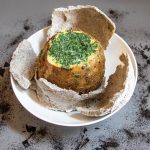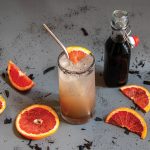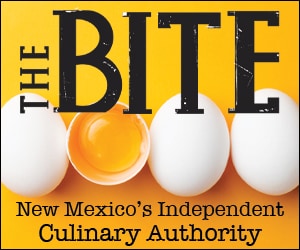Last summer while in Taos looking for food producers to connect to new markets, I ended up in Cid’s Market hunting for the most unique and interesting food products I could find. The jar of Taos Valley Honey jumped off the shelf at me and I could tell immediately that this was honey in its purest form. After my taste buds confirmed my suspicions, I gave Jason Goodhue a call to see if he had time to tell me about his honey. We met up later that afternoon and I could tell instantly he was a very amiable person with an intriguing story to tell.
Jason, originally from Leadville, Colorado, was first exposed to beekeeping through his uncles, when he was a kid. When asked how he ended up in Taos, Jason joked “the wind took me here.” This actually isn’t far from the truth, in his early twenties his car broke down near Taos and he never left. Working various jobs to pay the bills, he came across an opportunity at Questa Honey Farms. His previous experience with beekeeping gave him just enough knowledge to land the job. He started out in the warehouse, but before long he was out in the fields becoming a full-fledged beekeeper. Jason has a natural affinity for beekeeping, which ultimately led him to start Taos Valley Honey eight years ago.
The process of starting Taos Valley Honey took several years. The bees had to produce enough honey for Jason to harvest reasonable quantities to sell. He has sold his honey in stores around Taos for about five years—most of his initial business was at the Taos Farmers Market and other local events. Now Jason sells his product at Cid’s, Taos Herb Company, and other stores in and around Taos, as well as the Farmers Market. In addition the Honey Cottage in Colorado Springs, Colorado sells and ships his honey around the country.
Taos Valley Honey is unique for two reasons: Jason uses no antibiotics on his hives; and he cold processes the honey, meaning it retains all the original enzymes, resulting in a true raw honey. The FDA definitions for honey are vague and allow a wide variety of syrupy substances to be labeled honey—most commercially available honey has been heated, strained, or watered down. Taos Valley Honey also has a distinctive flavor as the nectar comes from wildflowers, meaning it is a polyfloral honey. Often grocery store honey comes from multiple sources that are blended together to achieve certain desired flavor characteristics while wildflower honey can differ from year to year in taste and aroma depending on what blooming plants bees can access.
A couple weeks later, Jason took me to a farm just south of Taos to collect honey, where I experienced beekeeping and the intricacies of bees, firsthand and for the first time. My bee encounter made me somewhat apprehensive even though I wore a full bee suit. After watching Jason’s young daughter, Angelina, interact with the bees without any protection I knew I had nothing to fear. Jason, also a gifted teacher, enjoys instructing others about bees as much as he enjoys beekeeping. His passion has led him to mentor young people in his community about bees and beekeeping, including classes during a summer camp with the Field Institute of Taos.
Taos Valley Honey bees produce honey all over Taos—Jason has cultivated relationships with landowners in and around the area for ideal environments for his hives. He uses both Langstroth (the white rectangular hives) and top-bar hives (the long canoe-shaped hives), which are barely noticeable on the vast landscapes they inhabit. Jason really enjoys these connections with landowners as they present opportunities to educate them about the biodiversity benefits bees and other pollinators offer to both agricultural and wild landscapes. In addition to his work as a teacher and mentor, he continues to expand his company by getting his products into more retail locations, building partnerships with other businesses and property owners, and selling honeybees to people looking to get into beekeeping. Find Jason and learn more about Taos Valley Honey at the Taos Farmers Market, or on Facebook.
Brandon Stam helps cultivate food entrepreneurs around New Mexico as a Project Manager for Delicious New Mexico.
Edible celebrates New Mexico's food culture, season by season. We believe that knowing where our food comes from is a powerful thing. With our high-quality, aesthetically pleasing and informative publication, we inspire readers to support and celebrate the growers, producers, chefs, beverage and food artisans, and other food professionals in our community.







